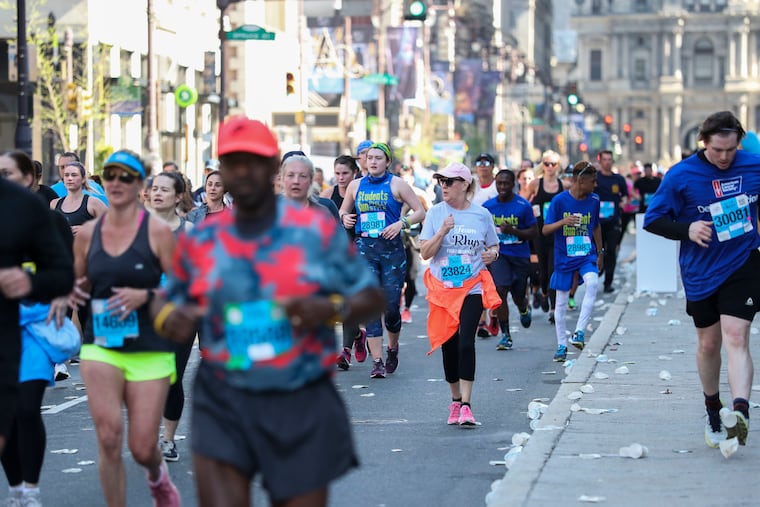How to kick-start a running habit, according to expert coaches
From running a local 5K to the Philadelphia Marathon, here are five tips from experts to help you prepare.

In 2006, when Jen A. Miller ran her first 5K, she was the type of person to say she hated running — a seemingly one-off race back then. Now, a little more than 15 years later, Miller has completed more than a dozen marathons, written about running in national publications, and authored the book Running: A Love Story.
What can start as a fluke can turn into a lifetime love. Wherever you’re at in your running journey, if you want to start preparing for a short fun run, or longer, more intensive races like the Philadelphia Marathon or Broad Street Run, the time is now.
To bring you more insight, The Inquirer spoke with Miller and her running coach, Gerard Pescatore, a 26-time marathoner and certified running coach of Philly-area Sweat Equity Running to share their tips.
How to motivate yourself to run
Ask yourself: Why am I doing this?
“Find a reason in yourself why you’re going to start doing this or else you’re going to lose motivation,” Miller said. “But don’t compare yourself to [past performance]. Don’t compare yourself to what your spouse runs, what your friend runs, or the winner of the race runs — you’re running for yourself.”
This reason will carry you through discouragement when “hitting the wall,” Miller and Pescatore said.
How to find good running shoes
This isn’t about looking the part, it’s about safety. According to Miller and Pescatore, solid running shoes are going to run you $100 to $165. Top of the line can go for $250 and higher. You don’t need the best gear when starting out, but you do get what you pay for in terms of comfort and safety.
You’ll need to figure out the length and width of your feet, foot arch, and running gait (a person’s movement and pattern of running). Runners with high arches need more cushioning, while lower arches require more stability. Some runners have a gait where they land on the inside or outside of their feet causing their feet to shift in the shoe.
“I would encourage people to visit a local running store. Staff at most independent running stores are very knowledgeable,” Pescatore said. “They’ll do a shoe fitting, a foot or a gait analysis for you. If you feel a little intimidated, go with a friend.”
Not only do local independent running stores help you find the right shoe and let you test them, Miller and Pescatore said, it supports the running community in your area. Plus, many local stores have free organized runs where you can meet others.
And if you’re on a tighter budget, make do with what you’ve got. Running is an expensive sport, so when you’re first starting out, don’t splurge on gear you may not use later on.
Running tips for beginners
Start small. The worst thing you can do is doing too much too fast. Long-distance runs take time to prepare for and it doesn’t happen overnight, Pescatore said — a lesson he learned over years of training.
Start off with running 10 minutes. Perhaps 30 seconds of walking, then 30 seconds of jogging, switching back and forth until you feel comfortable with more intense running. Then you might transition into a training plan that focuses on reaching a certain mileage, which then increases each week.
Don’t break the 10% rule, said Pescatore. This means that whatever benchmark you set for yourself, only increase the next benchmark by 10% or less. For example, if you set a goal of running 10 miles in the span of a week, you shouldn’t raise the benchmark past 11 miles the following week.
Don’t overwork yourself. One week out of each training month should be used for lower intensity running and resting. If there’s a day where your body tells you to rest — listen to it.
Both Miller and Pescatore suggest following the “Couch to 5K” training program which prepares you to run 3 miles in nine weeks.
How to set a goal for running a 5K or even the Philly Marathon
Whether your goal is to be able to run one mile without stopping or finish a marathon, you have to decide what you want for yourself. If you want to try a long-distance race, a 5K (3.1 mile) race is a good place to start — there are a ton of local 5Ks that don’t cost much to enter. Find a race you like and sign-up, setting a firm deadline for yourself.
Pescatore suggests runners train for eight to 12 weeks depending on their experience level. If you’re a newbie to running, give yourself at least three months to properly train.
How runners prepare mentally
The way you coach yourself will influence how you perform. Remember your reason for wanting to run and encourage yourself. Mistakes and needing to take breaks can and will happen — it’s part of the process, Pescatore said.
While motivation is crucial, you don’t want to be too “amped” while running long-distance as you want to keep a consistent pace. Miller suggests listening to a 30 to 45 minute podcast and doing your runs in that time.
Bring a friend or have an accountability partner, someone who can run with you or at least support you along the way. For runners who aren’t feeling the enjoyment, Miller and Pescatore suggest going to watch a long-distance race in-person. Watching others enjoy the sport and doing their best can sometimes spark motivation.